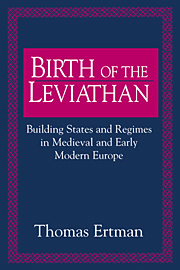Book contents
- Frontmatter
- Contents
- List of Tables
- Acknowledgments
- 1 INTRODUCTION
- 2 THE ORIGINS OF PATRIMONIAL ABSOLUTISM IN LATIN EUROPE
- 3 THE TRIUMPH OF PATRIMONIAL ABSOLUTISM AND THE FAILURE OF REFORM IN LATIN EUROPE, c. 1500–1789
- 4 BUREAUCRATIC CONSTITUTIONALISM IN BRITAIN
- 5 BUREAUCRATIC ABSOLUTISM IN GERMANY
- 6 THE TRIUMPH OF PATRIMONIAL CONSTITUTIONALISM IN HUNGARY AND POLAND AND ITS PREMATURE DEMISE IN SCANDINAVIA
- 7 CONCLUSION
- Bibliography
- Index
3 - THE TRIUMPH OF PATRIMONIAL ABSOLUTISM AND THE FAILURE OF REFORM IN LATIN EUROPE, c. 1500–1789
Published online by Cambridge University Press: 12 March 2010
- Frontmatter
- Contents
- List of Tables
- Acknowledgments
- 1 INTRODUCTION
- 2 THE ORIGINS OF PATRIMONIAL ABSOLUTISM IN LATIN EUROPE
- 3 THE TRIUMPH OF PATRIMONIAL ABSOLUTISM AND THE FAILURE OF REFORM IN LATIN EUROPE, c. 1500–1789
- 4 BUREAUCRATIC CONSTITUTIONALISM IN BRITAIN
- 5 BUREAUCRATIC ABSOLUTISM IN GERMANY
- 6 THE TRIUMPH OF PATRIMONIAL CONSTITUTIONALISM IN HUNGARY AND POLAND AND ITS PREMATURE DEMISE IN SCANDINAVIA
- 7 CONCLUSION
- Bibliography
- Index
Summary
It was during the century and a half between the French invasion of Italy in 1494 and the Peace of the Pyrenees in 1659 that both absolutism and the appropriation of core state functions by private groups and individuals became firmly entrenched across a Latin Europe now dominated by two polities: France and a Spanish Empire which included most of the Iberian and Italian peninsulas as well as the Low Countries. Rather than pursue their geopolitical goals in collaboration with (structurally weak) representative assemblies, the rulers of these states chose instead to use the considerable prerogative powers they had built up in the centuries-long battle against their territorial lords and against the domestic influence of the papacy to undermine or entirely eliminate those institutions. They then exploited the enhanced freedom of maneuver gained thereby to engage in an almost constant round of large-scale warfare.
Intense geopolitical pressure, far from furthering modernizing reforms in the interest of greater battlefield effectiveness, in fact led these states to make more extensive use of the kinds of appropriation-prone administrative and financial practices first introduced during the middle ages, despite the fact that more modern (and efficient) alternatives had been developed in the interim. By the mid-i6oos, proprietary office holding had become the norm in France, Spain, the southern Netherlands, Milan, Naples/Sicily (all Spanish possessions), Portugal, Savoy, Tuscany, and the papal curia. In addition, private financiers controlled most forms of revenue collection and short- and long-term borrowing in all of these states.
By the late 17th century, the internal contradictions of patrimonial absolutism had forced Spain and its Italian dependencies and allies out of the first rank of European powers.
- Type
- Chapter
- Information
- Birth of the LeviathanBuilding States and Regimes in Medieval and Early Modern Europe, pp. 90 - 155Publisher: Cambridge University PressPrint publication year: 1997



